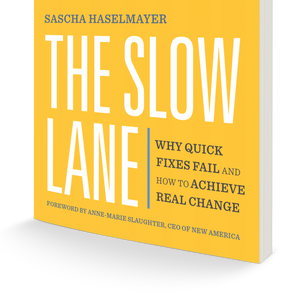As a parent, I have come to know so-called “turn-around schools” in both Barcelona and Brooklyn. In both cases, what I saw, was the power that a capable (often young) principal and leadership team could bring to energize what was considered a failing school. What failing means is, rightly, a matter of heated debate: are we talking grades, safety, discipline? But, and I say this as someone who is not at all an expert in education, what I saw, was the turn-around can yield results, academically, culturally and socially. Turn-around schools are just one of the opportunities to build a better European democracy.
1/ A Courageous Democracy, One Turn-Around School At The Time.
We discussed such turn-around schools at this week's Changemaker Europe Ideas Lab hosted by Ashoka and The Good Lobby. We wanted to strengthen democratic participation in Europe. Why turn around schools? Because our analysis showed that many people living in Europe need a better mix of courage, self-belief and opportunity to participate. And where schools get turned around, a window for real change is opened.
Turning around a school, we found, could be a perfect catalyst to create not just an academic, but a community project. Imagine if next to a tag team of highly motivated teachers, we also invested in quality community organizing and experiences to strengthen the belief of children and families that they, too, can make a difference. Change things around them. Investing alongside a school could create a hotspot not just of academic improvement, but a shared experience in civic participation.
Imagine how, over the course of 3-10 years, the pieces could come together in a new way to really change what it means to grow up in a community. Schools could offer more democratic participation, sharing power with children and giving them a taste of true participation. Here, in-school transformation teams can tap into the expertise of social entrepreneurs like Marina Weisband, a German politician who founded Aula, a non-profit helping public schools share power with children in German public schools.
To see transformation take hold outside a school, see what is happening in Brownsville, New York. In Brownsville, community organizing helped build the foundation that now lets families hold public services more accountable, and unlocked the creativity of Brownsville to overcome longtime fears and racial injustices that marked the community for generations. Today, Brownsville has formed a partnership to reimagine what it means to grow up in the neighborhood. All this is as much about better public services as it is about making a concerted effort to create the opportunity, motivation, and support for participation. As they rack up successes, families in Brownsville feel ever more invited, and capable, to make a difference. There is much here to inspire our thinking in Europe, on how we can heal our democracy.
‘This grammar school boy is not going to take any lessons from that public school boy on the importance of children from less privileged backgrounds gaining access to university.’ Michael Howard addressing Prime Minister Tony Blair, 2003
2/ Prime Ministers' Questions 2.0
Building a more courageous democracy in Europe, one turn-around school at a time, was just one of the ideas that got me dreaming. Another group, focusing on the problem of growing political polarization, developed a range of interesting ideas. One, that I found appealing, was a program to let people try out different 'liquid' identities, as an effort to combat overly entrenched positions. Eventually, the group settled on a more practical proposal: the concept for a new Sunday prime-time TV show in which political leaders, experts, social entrepreneurs, and activists would answer questions by citizens about reform proposals. The idea was to take elements that make citizens assemblies successful, and turn them into a new political ritual accessible to all. A kind of Prime Ministers' Questions 2.0, in which political leaders are schooled to share their platform with other people that contribute valuable perspectives. It breaks with the norms of town halls, in which leaders alone answer questions, to create a more deliberative exchange. True to Slow Lane principles, it holds the promise of replacing a Fast Lane quick-fix culture of politics in which leaders simply defend their ideas, with more nuanced conversations in which new answers can be found.
3/ Assembling The Agency In Europe.
Citizen assemblies can be valuable enablers of Slow Lane movements, like the abortion-law reform movement in Ireland. A group focusing on opening our political culture in Europe developed the idea of a permanent European citizen assembly to energize change. The idea here would be symbolic as much as functional. By sharing powers with a citizen assembly, European institutions and politicians would signal that they are willing to allocate resources—and power—differently. It could help replace the image of a distant European bureaucracy with a process in which ordinary citizens can help set the agenda, and find new answers for Europe. And it could well be broadcast live, on prime-time TV.
Supporting Spaces And Structures For Diversity & Inclusion.
The fourth idea deals with the sad reality of under-representation of many groups in European politics and policymaking. The group invite us to imagine a Europe in which truly all agendas have a fair chance to be heard, and where the pathway to power is open to people from all backgrounds. Two pieces come together in this idea. The first is to upgrade online tools like Parliament Watch with deliberative functionality to let people not just hold elected officials accountable, but develop better questions together. I wrote about the lack of such digital spaces in my review of “The Quiet Before”, where author Gal Beckerman is frustrated by a lack of digital tools that facilitate the origins of radical new ideas.
The second part of the idea complements the digital offering with being of service in the real-world: Leaders from disadvantaged communities need support to play a more active role. Here we need to counter the preference of political parties to promote leaders who have legitimacy in the political party, and instead identify emerging leaders with legitimacy in their communities. And give them tools, help them run for office and then stay with them, to help them stay in office. Political leaders, especially those from more diverse backgrounds, require wellbeing support to counter a toxic political environment. This doesn't just benefit those in power, but it creates new, healthy role models for others. To achieve this, we will need to create better support for all forms of civic engagement: scholarships, funding for activists, actual pay for civic engagement, lobbying vouchers, and “civic time off” by employers.
A Taste A Slow Lane Europe.
Europe, to many, is an abstract notion. It is a group of countries, a shared economy, and the ability to live and work anywhere. And Europe is a parliament and a set of institutions administered by what the public has come to know as Commissioners and Eurocrats - a unique breed of dispassionate policymakers who regulate common markets, safety standards, goods, and laws and manage the impossible diplomacy of aligning the interests of 27 member states.
All these ideas are the result of a small, but well-curated brainstorm. But combine these ideas, and the contours of a Slow Lane Europe emerge. A local Europe in which communities work together across generations and abilities to not just turn around schools, but reimagine what it is like to grow up a courageous citizen. And put that in action, not just by political means, but by creating the kind of experiences known to nurture our belief that we can make a difference. It is a policymaking Europe where our central, most remote institutions, share power with citizens of all walks in a deliberative citizen assembly, that helps us tackle divisive issues and signals to everyone: there is a path for you, to make a difference. A political Europe that enjoys a new political ritual, broadcast at prime time, to see deliberative democracy in action. A solidary Europe that recognizes that access to power isn't equally distributed, and that sharing the agency means offering tailored support to level the playing field for leaders from disadvantaged communities. So that truly everyone can participate in civic life, policy, and politics. And it is a digital Europe that offers the online spaces designed not to drive people apart, but engage people and leaders in a constructive dialogue to find new answers.



